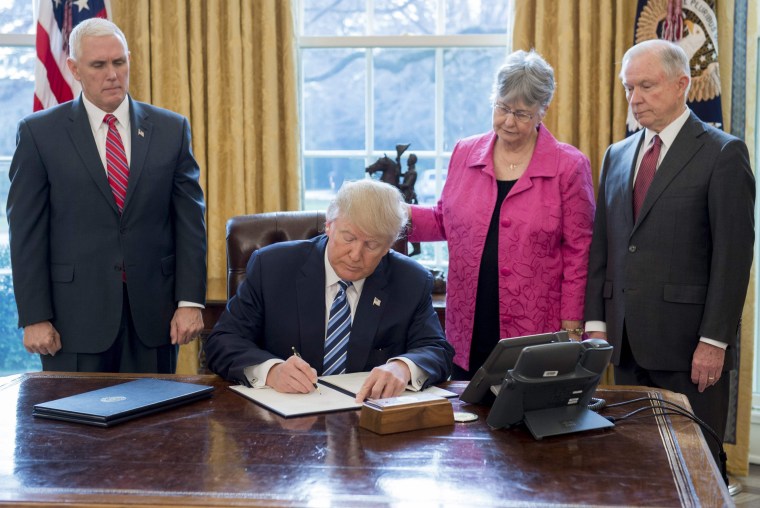Promising the start of "a new era of justice," President Trump signed a series of executive orders Thursday that outlined his administration's top crime-fighting targets: international drug traffickers, attacks against cops, illegal immigration and a recent uptick in violent crime.
"America faces many challenges. We face the menace of rising crime, the threat of deadly terror, and it's not getting better," Trump said before signing the orders and swearing in the man who will carry out his agenda, Attorney General Jeff Sessions. "But it will very soon."
Sessions warned that the increase in crime was "a dangerous permanent trend," an assertion that many researchers say is not backed up by data. Murders and violence rose in 2015, but remain at historic lows, according to federal crime statistics.
Related: Why President Trump’s Misleading Image of American Crime Matters
The first of Trump's executive orders targets international drug cartels, blaming them for the increase in overdose deaths "and a corresponding rise in violent crime related to drugs" — a connection that experts in drug policy said is difficult to prove.
While it made sense to go after cartels, they said it was a stretch to assume that a crackdown on them would cut significantly crime in America.
They also said it was simplistic to blame cartels on the rise in drug deaths when the opioid epidemic is directly linked to the spread of prescription painkillers.
"There's a lot of huffing and puffing and I'm not sure what he's blowing down," said Peter Reuter, a University of Maryland criminologist.
Harold Pollack, co-director of The University of Chicago Crime Lab, said there was little evidence that "transient" shifts in enforcement strategies impacted street crime.
An effective drug policy must include a "more humane" approach to drug addiction, Pollack added.
The second of the orders shifts more attention to prosecuting people who "commit or attempt to commit crimes of violence against Federal, State, tribal and local law enforcement officers." It directs Sessions to use existing laws to do this, but to also recommend new ones that may define "new crimes of violence" against police — or set new mandatory-minimum sentencing requirements.
John Pfaff, a professor at the Fordham University School of Law, said he was struck by another provision of the order that calls for making sure federal grants adequately support and protect law enforcement authorities.
Related: Department of Justice to Collect Data on Police Shootings, In-Custody Deaths
That, Pfaff said, appears to be "an attack" on the FBI's plans to state collecting data on shootings by police, an effort that grew out of a national uproar over police use of deadly force.
Trump has said that police have been unfairly targeted, and has pointed to a recent uptick in the number of the officers shot and killed in the line of duty.
Related: Eight Shot Dead: 2016 Sees Year-Over-Year Spike In Cops Killed By Gunfire
But those statements appear to have overlooked reports that show that, over the long term, it is getting safer for police.
Pollack said the emphasis on officer safety should be balanced with efforts to calm tensions between police and minority communities that complain of police mistreatment.
"If this executive order becomes part of a cycle of polarization that worsens the situation, then we're going to have more of a problem," Pollack said.
Trump's third executive order directs Sessions to form a task force on crime reduction and public safety, with a focus on illegal immigration, drug trafficking and violent crime. The goal is to identify how existing laws fall short and what new laws are needed, the order says.
The emphasis on illegal immigration fits Trump's broader national security policy goals. But in relation to crime reduction, prioritizing illegal immigration seems "odd," Reuter said.
Immigrants who are in the country illegally are not responsible for a large share of American crime, he said.

